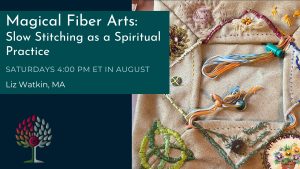For Cherry Hill Seminary, the year 2022 was one of continuing steady growth, implementation of significant system improvements, and celebration of the accomplishments of our students and faculty. The following is a summary of key accomplishments.
Programs
Our programs—the courses we offer, and our degrees and certificates—are the core of who we are as a Seminary. As a business, they are our product; as a religious education organization, they are our outreach and gift to the world. Assuring the integrity of our programs is critical for serving our students, who are the reason Cherry Hill Seminary exists.
Beginning January 1, 2022 the Seminary formally hired our first paid academic dean, Dr. Margo Wolfe. Dr. Wolfe has deep experience in higher education, as well as her own nearly lifelong path as a Pagan. She has provided outstanding guidance, leadership and management, following in the wide footsteps of our former volunteer academic deans, Dr. Candace Kant and Dr. Wendy Griffin. Transitioning this position to one that is paid is still another step towards stronger accountability and meeting higher education standards.
Dr. Wolfe has worked throughout 2022 to get to know faculty, our department chairs, and help all professors bring their courses into compliance with curriculum standards. They are assisted in this task by the curriculum guide written for us by Dr. Wolfe in 2021 when she was hired by the Seminary as a consultant. She has also updated our Faculty Handbook and the Student Handbook and Course Catalog.
The Spiritual Direction Certificate, first offered in 2021, began a second cohort in spring of 2022. Ten of these students will receive their “SpiDir” certification in an online ceremony in March 2023. A third cohort will begin in September 2023, and the second cohort will complete their course in early 2024. The Community Ministry Certificate continues to fill an important need for non-graduate education, training and spiritual development for grassroots leaders. They are individually mentored for fifteen months by one of our eight faculty-mentors.
Dana Doerksen, MLIS, has provided valuable coordination for library-information services for the past year. She conducts periodic training seminars for students and faculty, as well as a column for the newsletter. Ms. Doerksen is the point of contact for individual student and faculty requests.
The Coming to the Center podcast holds one interview each semester with thought leaders, scholars and experts in Pagan spirituality. The programs are free and open to the public. Guests in 2022 included Dr. Giovanna Parmigiani, Dr. Graham Harvey, and Dr. Caroline Tully. The office continues to fill orders for basic print lessons (not correspondence courses) for incarcerated Pagans, called Pagan Life Academy. We are contacted regularly by prison chaplains and others inquiring about resources for their Pagan inmates. SpiDir Coordinator and faculty member Rev. Amy Beltaine continues, with a committee of students and others, to host A Spiritual Feast, a twice-monthly online ritual which is open to all.
Responding to students’ ongoing concerns about COVID, the Seminary held our first-ever online weekend intensive for graduate students, a requirement for graduation, entitled “The Shifting Religious Landscape: Ministry in an Interspiritual World.” A total of 178 registrations were received for the following courses which were offered in 2022:
Rites of Passage
The Bible for Heretics
Counseling Skills & Therapeutic Interventions
Personality Theories
The Radical Humility of Earth Wisdom (Insights 4-week)
Greek and Roman Necromancy
The Ritual of Play and Game Design
Psychopathology
Understanding the Ritual Experience
American Folk Magic (Insights 4-week)
Germanic Pagan Perspectives (Insights 4-week)
Liturgical Design: Beyond the Wheel of the Year
Group Theory & Dynamics
Ethics and Boundaries
Chaplaincy
Research Design & Methodology
The Ritual of Writing (Insights 4-week)
The Dark Goddess: Her Many Faces and Expressions (Insights 4-week)
The Seminary also offered a short graduate course on Unitarian Universalist history, taught by Rev. Amy Beltaine and approved for credit towards UU ministerial credentials.
Students
At this time twenty-two students are pursuing a graduate degree, twenty-four a Community Ministry Certificate, eighteen a Spiritual Direction Certificate, and many students or guests sign up for individual Insights and other courses. We anticipate the graduation of at least one, and probably more students as they receive their Master of Divinity degree.
The Seminary was proud to announce last year that Rev. Karen Andersen (“Gwen”), the minister of New Bedford Unitarian Church, was formally ordained to the ministry by the Unitarian Universalist Association.
Last year the Votaries Alumni Circle awarded the second Wendy L. Griffin Professor of the Year Award to Rev. Amy Beltaine. They also sponsored honorariums for Coming to the Center guests, as well as holding several online member socials.
Dr. Wolfe has launched a semester kickoff meeting for all students and faculty which begins in 2023.
Volunteers
The Seminary has always relied heavily on the selfless support of gifted volunteers. Our department chairs, dean of students, librarian and marketing coordinator are all volunteer positions. One could also say that our staff offer considerable volunteer talent since their salaries continue (at this time) to fall far below what they might earn in similar positions at other institutions. For the invaluable contributions of this group we are profoundly grateful.
We especially appreciate the Votaries Alumni Circle, and the Advisory Council. Votaries members sponsored two of our Coming to the Center speakers (who receive a small honorarium). The Advisory Council is available to leadership and staff who have particular questions in the area of a Council member’s expertise.
Systems
After more than fifteen years of relying on open-source software (Moodle) and limited student records management resources, the Seminary launched a new student information system. Populi contains all student, donor and other contact records, online classrooms, and provides tuition invoicing and payment, a variety of communication channels, and donor management. Best of all, it is hosted on the Populi server and the company has provided some of the best technical support we have ever experienced. For the time being Moodle continues to house our certificate modules. Its latest updates appear to be stable and more streamlined.
While the Seminary had begun to use QuickBooks Online in 2021, in early 2022 we became a client of QuickBooks Online Live Bookkeeping. Much of the year has been spent setting up the system to manage all of our accounting in one system, and to ensure full accountability. We now have an ongoing relationship with one accountant who is part of a team assigned to us. Going forward, this will greatly enhance the ability of leadership and management to clearly see our revenue streams, spending needs, savings progress and more. With this support we can move beyond the day-to-day finances of our early years, being now better able to forecast, budget and plan accordingly.
Since 2008 the primary phone number for the Seminary has been a toll-free internet-based number. Calls out by the office have been on a staff personal phone. Last January we opened a mobile phone account with a large carrier using a donated smartphone. By the end of the year we had realized that times have changed; by now nearly every phone plan in the U.S. offers free long distance calling. Most people contact us by email through the web site, and many of the calls we received on the toll-free number were spam calls (for which we were charged). In December we discovered that Zoom offered an excellent new phone plan. By the time of this writing we have discontinued both the toll-free account and the mobile phone account, porting the latter number over to a new Zoom phone account which is far less expensive and more flexible.
As a distance education institution, Cherry Hill Seminary has held real-time meetings since at least 2005, first by live chat in Moodle, then by Skype or Google, and for several years in Zoom. At the end of the year we opened a new Zoom Education Plan which is far more flexible for professors and staff.
In the spring we discovered that our internet host provider had been absorbed into one of the two giant companies which have acquired many of the companies commonly used in this country. Service and reliability, as well as support availability, had seriously declined in the previous six to nine months. Following a period when our entire web site (but not classrooms) was offline, we researched other options. We have now moved all of our services to a new provider (InMotion) which has been a dramatic improvement in reliability, cost, and support.
All of the changes described here are essential to meet the standards for both the S.C. Commission on Higher Education and those of potential accrediting bodies. More importantly, they help us to better serve our students.
Governance
The Board of Directors met monthly to review Seminary business, examine and receive financial and other reports, and discuss matters deemed important for board consideration. An essential aspect of board governance is to regularly check progress on strategic goals. A new goal was set at the end of the year to spend 2023 reviewing the current mission and vision statements and consider whether changes are needed. As our students and programs evolve with the needs of changing communities, this becomes even more important. A second goal is to complete updating and revisions to our bylaws begun in 2022, another task which helps to strengthen the organization at the same time that we comply with higher education standards.
Our budget reflects the board’s attention to both operations and programming. As a result of recent market changes, one important change being made is to move our endowment and savings into a higher-yield account. Although staff are in charge of daily management decision-making, board members bring considerable expertise to their board service; they often advise the director, e.g., on important changes such as moving our savings, or increasing expenditures for the QuickBooks Online Live Bookkeeping, Zoom Education Plan, and new phone.
Contributions
Donors continue to provide nearly twenty per cent of the Seminary annual budget. Fundraising not only brings in critical funds, but engages individuals who give, empowering them to be part of our service to the wider communities of our students.
A View of 2023
In the year ahead, Cherry Hill Seminary looks forward to welcoming a growing number of students to each of our programs. We are actively building faculty capacity, strengthening infrastructure as described above, and developing our leadership. Our vision of the future is to continue our work towards future accreditation, while providing the best possible education for serving the spiritual needs of Pagan and other Nature-Based Spiritualities.


